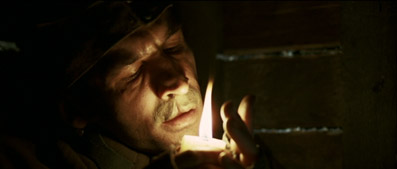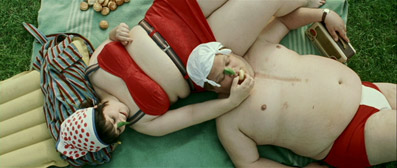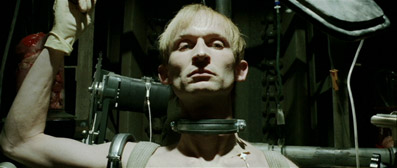|
Here's
a warning. If you're someone who switches
channels when they hear that the following programme contains
strong language and scenes that some may find offensive,
then take my advice and don't, whatever you do, buy or rent
Taxidermia. Believe me when I assure you that if you're upset
by actors getting naked or fruity with their language, or
a bit nasty with the violence, then you are definitely not
ready for what's on offer here. As someone who has no problem
with any of this and delights in seeing taboos busted, I'm
not sure even I was ready for it. But then I went in cold,
aware only that it had severely divided fans of director
György Pálfi's first feature Hukkle,
many of whom were somewhat dismayed at the direction he had taken with his follow-up film. I haven't seen
Hukkle and knew little of Taxidermia
when the disc landed on my doormat. This can be a good way
to approach many films if you are able, but can be a little dangerous
with cinema of the extreme. Unless you're prepared for anything.
Taxidermia is a tale made up of three acts that focus on three generations of
males of the same bloodline. It kicks off in WW2 Hungary
with put-upon, hair-lipped army orderly Morosgoványi
Vendel, who is stationed at the isolated house of his surly commanding
officer, where temptation in the shape of the officer's
two comely daughters results in varied and frequent masturbation
on Vendel's part. He's been warned of the consequences of
spying on the girls, and they think he's creepy anyway, but
when cautioning Vendel, the commander omitted to include his portly, sex-starved
wife Irma, in whom Vendel plants his seed. This results in the birth of Kálmán, who in young adulthood grows in every
direction to become a contestant in international eating
contests, where he just keeps missing out on the top prize. His
marriage to fellow food athlete Aczél Gizi produces
a son, Lajoska, who develops into a thin and weasel-like adult
whose work as a taxidermist is interrupted only to take
care of his now corpulent father and his oversized cats.

Now
if the above plot summary leaves you wondering what the
fuss is about and convinced this will be an easy ride, here
are a few sequences you should be aware of:
-
A
real pig is killed, cooked on a bonfire, and chopped up
for eating;
-
The
sex between Vendel and Irma is explicit and takes place
on the open pig's carcass;
-
The
masturbation is also explicit and the use of a greased
hole in a shed wall as a masturbatory aid results in
Vendel's penis being pecked by a rooster;
-
Vendel's
fondness for ingesting candle flames results in an ability
to ejaculate fire, which is also explicitly demonstrated;
-
Vendel
has paedophiliac fantasies inspired by Hans Christian
Anderson's The Little Match Girl that causes
him to orgasm so hard that his ejaculate shoots off into
the cosmos;
-
Baby
Kálmán is born with a pig's tale that his
disgusted father cuts off in close-up with pincers.
I
should point out that this lot are are all from the first story,
and I haven't included what Vendel's commander dourly claims
makes the world go round. If you get through
this then you just might be ready for the mass vomiting
that follows each round of the eating competition and its practise
sessions, the huge close-up of a pigeon's anus as it ejects
waste onto the pavement, and the skinning of a gorilla's
corpse in preparation for its everlasting preservation.
Even then you'll probably be ill prepared for the special
job Lajoska does for one customer, or the extraordinary
finale in which he... no, I'm not going to give that one
away.
Such
content is likely to severely narrow the film's potential
audience, and even they will likely be further divided by
the question of whether Taxidermia inventively
explores man's baser instincts or gleefully revels in them.
There are certainly times when you can't help suspecting
that Pálfi is deliberately playing the provocateur, but he does
so in the manner and tradition of surrealist cinema of years
past, whose shock tactic lineage runs back to 1928 and the
eye slicing in Buñuel and Dali's Un
Chien Andalou. There's certainly more to Taxidermia
than its ability to offend audience sensibilities, and more
to argue about.

Accusation
#2 has charged that Pálfi holds his characters
in contempt, a middle class disgust at the excesses of the
proletariat, who are presented as physically unattractive
people with creepy habits, unpleasant personalities, and
unattainable dreams. Of the three generations, only Kálmán
gets the girl he desires, and that's only after his friend
and fellow eating champion Béla has had his way with
her. The fantasy/reality editing of Vendel's encounter
with Irma, meanwhile, makes it uncertain whether this actually happened
at all, her pregnancy perhaps the result of supernatural forces
rather than actual intercourse. But
there's a degree of delight to every disgusting moment and
a narrative alignment with the characters and their destinies
that creates a peculiar bond of empathy. You find yourself
genuinely concerned for the risks Vendel takes in pursuit
of masturbatory pleasure, for the wellbeing of Gizi when
a demonstration of her ingestive skills puts her pregnancy
at risk, and for the desperate measures Lajoska is prepared
to go to in order to make his mark on a world that values
his work more than it does its creator.
Despite
its extreme content, Taxidermia is not
an exploitation film, something evident in the inventive
care with which individual sequences are handled, from the
extraordinary sideways rotating camera move that provides
a compressed history of the uses to which a wooden bath
has been put, to the pop-up storybook that seamlessly transforms
into a set with costumed actors, and the sleight-of-hand
effects work that enlarges Kálmán's cats to
just beyond what could possibly be right for such animals.
There's a darkly infectious energy and wit at work here
in all aspects of the production, with performances that
confidently walk a fine line between naturalism and the
grotesque, historical detail that parodies without tumbling
into outright mockery (the organised Communist era rah-rah
at the eating contest is particularly well done), and special
effects that take a surrealistic gag that bit further than
you'd have thought anyone would dare (the aforementioned
space-bound ejaculation made me laugh out loud). The structure
clearly has purpose, in the changing fortunes of the generations,
in the relationship between father figure and son and the
expectations of one for the other, in the connection of meat and flesh – it's just not always clear Pálfi
is trying to tell us, if anything.
But
if you're looking for something outside of the mainstream
norm then Taxidermia should be at the top
of your list, although you'll need a strong stomach and
an open mind if you're going to stay with it until the memorable
ending. Whether, as some have suggested, Pálfi really
is cynical about the human race or is just having fun with
the idea of such cynicism is hard to say, and it probably
doesn't matter. Taxidermia is demented,
twisted and inspired fun for the tolerant, an experience
quite unlike any other at the moment, and one film that we
can be sure is not going to be the victim of a Hollywood
remake any time soon.
A
fine anamorphic 2.35:1 transfer copes well with a range
of traditionally tricky lighting situations, including mist,
dim interiors and candlelight, without losing detail or
the solidity of black levels. Colour and contrast are very
good and there is no evidence of obvious edge enhancement.
Gergely Pohárnok's cinematography is consistently
impressive and the transfer here does it justice.

The
usual Tartan trio of Dolby stereo 2.0, Dolby 5.1 surround
and DTS 5.1 surround are on offer, with the surround tracks
winning hands down on ambience and atmosphere, although
tonal range and clarity are very good on all three. The
DTS track is noticeably louder than the 5.1 and occasionally
a little shrill, otherwise there's little to choose between
them.
Trailer
(2:11)
The original Hungarian trailer, with optional English subtitles.
Look
the film up and the word you'll see most used is 'disgusting',
even in the positive reviews, but if that doesn't put you
off you could just be in for a twisted treat. No film is
going to be everyone's cup of tea but that goes treble for
Taxidermia. Heed the warnings before you
take this ride, but if you're up to it then it's definitely
a ride worth taking. Tartan have really skimped on the extras,
but have delivered on the picture and sound, and that's
where it counts.
|